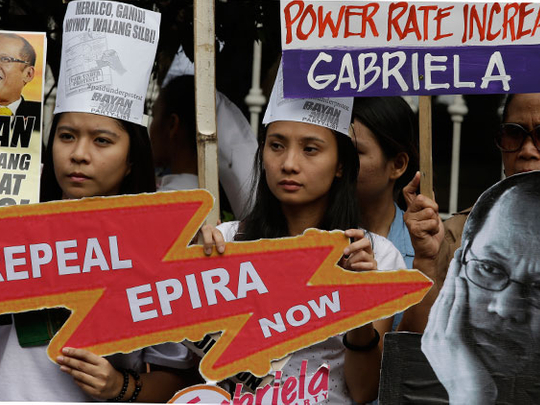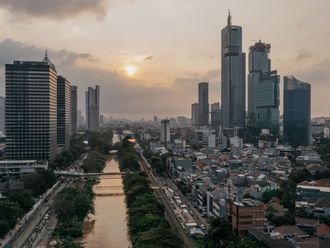
Manila: Consumers and militant groups held rallies in several parts of Metro Manila and at the Supreme Court where a private distributor of electricity, private power suppliers, and a government regulator were seeking approval for a 30 per cent hike in power tariffs.
The apex court temporarily froze the planned increases last month.
To dramatise the issue, Bayan, a militant group, propped up “Juan de la Cruz”, representing the common man, on a mock electric chair during a rally at a payment centre of the Manila Electric Company (Meralco) in Manila’s Sampaloc district.
Meralco’s proposed additional P4.15 (Dh0.34) kilowatt per hour rate hike is “killing everyone”, explained a Bayan member.
The same group, together with a workers’ group, staged another rally simultaneously at the Supreme Court.
Another militant group, Children of Sweat, launched a 30-minute self-imposed power outage in a depressed area in Sampaloc, following an overnight vigil against Meralco.
At the Supreme Court, representatives of Meralco, private power suppliers, including the Solicitor-General who represented the Department of Energy and the Energy Regulatory Commission (ERC) insisted there was no collusion to raise electric rates at the expense of consumers and to the advantage of private companies.
This argument was rejected by congressmen from several parties in the House of Representatives such as Bayan First, Gabriela, Alliance of Concerned Teachers, and Teachers’ Partylist, who took up the court fight on behalf of Filipino consumers against the “electricity giants”.
“The government did not support Filipino consumers,” said lawyer Leonard De Vera who represented the National Association of Electricity Consumers for Reforms (Nasecore) during the oral arguments at the apex court.
The atmoshphere was tense during this part of the debate, especially when the associate justices asked questions to clarify the issues raised by representatives of pro-consumer groups.
Outside the Supreme Court, protesters complained about retired Supreme Court Associate Justice Antonio Eduardo Nachura who represented Meralco.
“For us, he is an undue advantage for a powerful private group that is anti-consumer,” said protester Dave Datu.
Protesters also complained about the Solicitor-General who represented the Department of Energy (DOE) and Energy Regulatory Commission (ERC) in the oral arguments.
“The government should be protecting consumers, not businessmen who take advantage of consumers,” Datu added.
The High Court has yet to decide whether the ERC violated consumers’ rights to due process and a provision of the Electric Power Industry Reform Act (Epira), which requires ERC to publicly hold debates and protect the public from market abuse, Datu explained.
“We also called on the Supreme Court to approve our demand for the amendment of a part of the EPIRA law, which allows automatic rate adjustments or increases to recover generation cost incurred by a private power distributor,” said Datu.
“This issue is related to our claim that ERC’s unilateral decision on December 9 to Meralco’s proposal was not valid,” Datu added.
The consumer groups also called for a refund of payments made for electricity in December, when Meralco’s proposed rate hike was approved.
Meanwhile, Meralco, private suppliers, the department of energy, and the ERC called on the Supreme Court to lift a 60-day temporary order against the power rate hike, which Meralco had approved.
The Supreme Court did not announce a decision after the contending parties debated the whole day.












